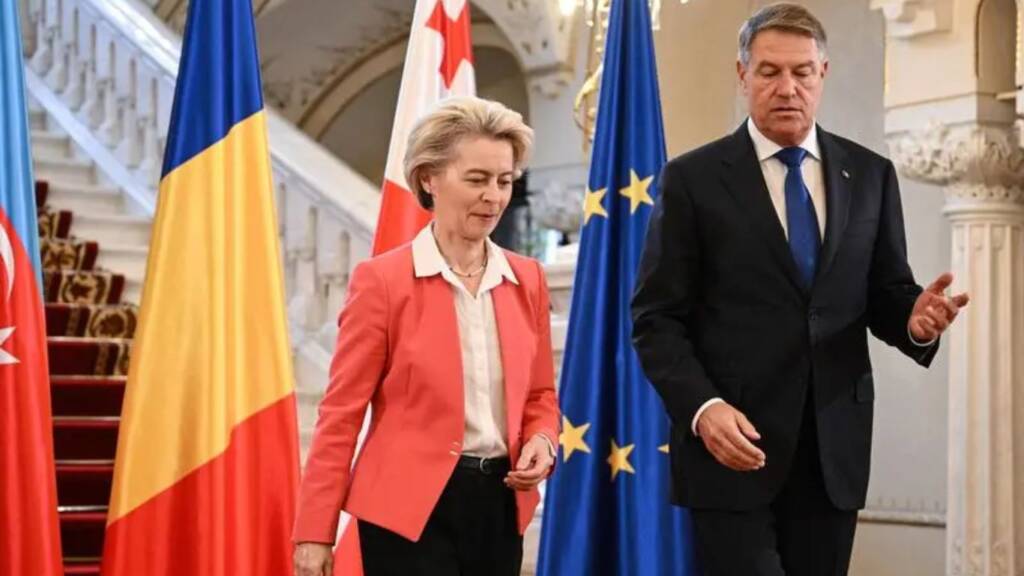Romania is going through a turbulent political time, as it is witnessing one of its most chaotic moments in the 21st century. An election annulled, a controversial leader pushing for a comeback, and the European Union watching from the sidelines as if it were a political thriller. While Bucharest’s streets erupt in protests, the top court’s rulings seem like mere formalities.
Now, in the thick of a political blame game, the courts have identified their target—Klaus Iohannis, the outgoing president who just resigned under extraordinary circumstances.
Romanian President Klaus Iohannis announced his resignation on Monday following an impeachment process sparked by public outrage over the cancellation of last year’s presidential election.
A CANCELED ELECTION
The country’s top court invalidated the December vote, citing alleged Russian interference before the first round, which was won by a relatively unknown far-right candidate. Iohannis, a pro-European leader, initially vowed to stay in office until the rescheduled elections in May. However, mounting political pressure and an aggressive impeachment push from lawmakers forced his hand. On Monday, legislators moved forward with impeachment proceedings after two previous failed opposition-led attempts.
“To spare Romania and its citizens from the crisis… I resign as President of Romania,” Iohannis declared, confirming that he would officially step down on Wednesday.
He warned that his suspension would throw Romania into further instability, impacting both domestic governance and international relations. Despite the accusations, Iohannis insisted, “I have never violated the constitution.”
Iohannis’s resignation was met with celebration from far-right factions. In Bucharest, hundreds of supporters rallied in the streets, leading to clashes with police.
Calin Georgescu, the far-right candidate who won the annulled first round, hailed the resignation as a “victory for the Romanian people” and demanded that the second round of elections resume immediately.
GEORGESCU CONTINUES TO RISE
George Simion, leader of the far-right AUR party, echoed the sentiment, calling Iohannis’s resignation a triumph for the public.
The conservatives have been gaining significant traction in Romania, securing an unprecedented third of the votes in December’s parliamentary elections. Economic struggles, including soaring inflation and unease over Russia’s war in Ukraine, have fueled their rise.
The controversy surrounding Iohannis’s resignation is just one part of Romania’s ongoing political turbulence. Last month, tens of thousands protested against the election’s cancellation, many demanding that Iohannis step down. His temporary replacement is expected to be Senate President and liberal leader Ilie Bolojan.
Political analyst Radu Magdin observed that Romania’s current political climate favors populist and anti-establishment narratives. However, he suggested that with Iohannis’s exit, the far right has lost a convenient political scapegoat.
Iohannis, 65, has been at Romania’s helm since 2014, navigating multiple political crises. Yet, critics argue that he was largely detached from public concerns and failed to deliver on promises of a more “educated and normal” Romania.
The annulment of a national election is a rare event within the European Union and has plunged Romania into deep uncertainty. Georgescu has labeled the election’s cancellation a “formalized coup d’état,” further fueling tensions.
A fresh presidential election is now set for May 4, with a potential runoff on May 18 if no candidate secures more than 50% of the vote in the first round.
The constitutional court’s decision to cancel the vote came after intelligence reports cited “aggressive Russian hybrid actions,” including cyberattacks and a significant social media push promoting Georgescu’s candidacy.
Georgescu—labeled as an admirer of Russian President Vladimir Putin and a vocal critic of NATO—has recently rebranded himself as “ultra pro-Trump.” Despite the allegations, he denies any connections to Moscow.
As Romania braces for new elections, the political landscape remains highly volatile. With the EU closely observing the unfolding crisis, the country must navigate rising nationalism, economic struggles, and geopolitical tensions. Iohannis’s resignation may have been seen as an act of crisis prevention, but the real battle for Romania’s future is just beginning.
